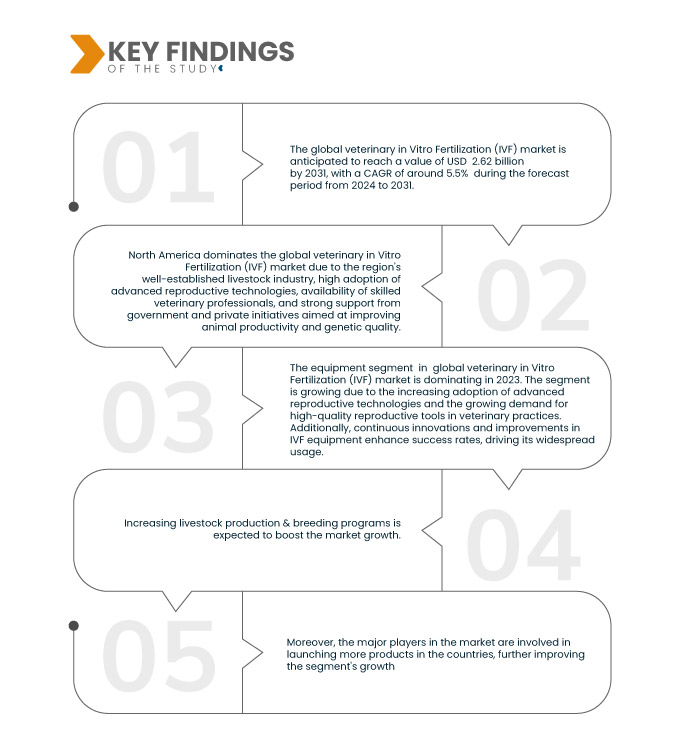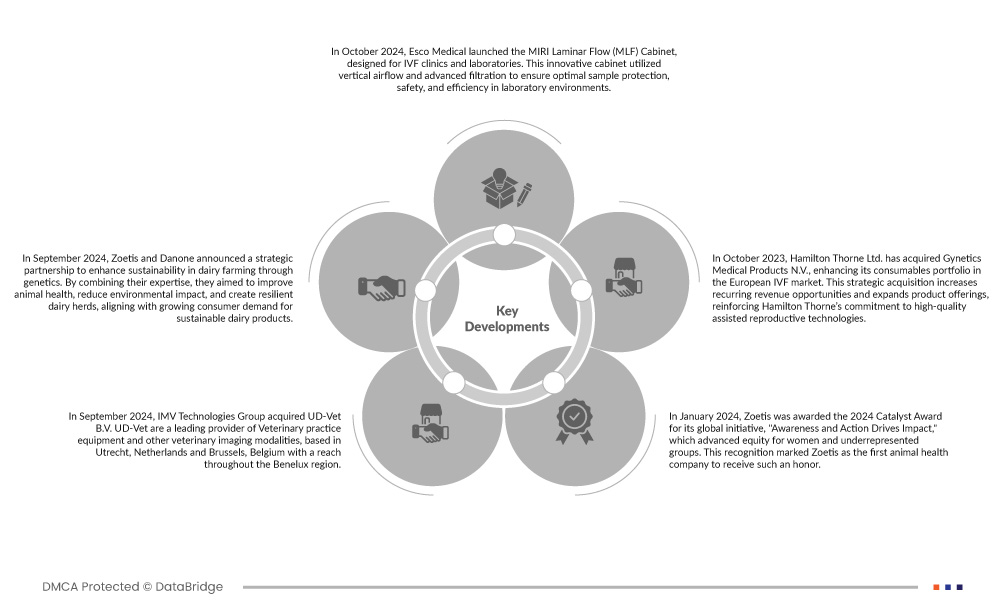يُسهم الطلب المتزايد على الماشية عالية الغلة، مثل الأبقار والأغنام، في دفع عجلة سوق التلقيح الصناعي (IVF) البيطري العالمي بشكل كبير. ومع ازدياد عدد سكان العالم، تزداد الحاجة إلى مصادر غذائية مستدامة، لا سيما في قطاع الثروة الحيوانية. غالبًا ما تُعيق أساليب التربية التقليدية التحسين الوراثي وكفاءة الإنتاج. في المقابل، تُعزز تقنية التلقيح الصناعي برامج التربية، مما يسمح بتحقيق تقدم كبير في علم الوراثة والإنتاجية الحيوانية. يُمكّن التلقيح الصناعي المُربين من اختيار صفات وراثية متفوقة وزيادة عدد ذرية الحيوانات القيّمة، مما يُحسّن جودة القطيع وإنتاجيته. لا يُلبي هذا فقط الاحتياجات المتزايدة من إمدادات الغذاء، بل يدعم أيضًا هدف القطاع الزراعي المتمثل في تطبيق ممارسات أكثر كفاءة واستدامة. علاوة على ذلك، يُساعد التلقيح الصناعي في الحفاظ على المادة الوراثية، وهو أمر حيوي للحفاظ على التنوع البيولوجي وحماية الثروة الحيوانية من الأمراض.
يُعدّ اعتماد تقنيات الإنجاب المتقدمة، مثل التلقيح الاصطناعي، مفيدًا بشكل خاص في المناطق التي تواجه تحديات تتعلق بإنتاجية الثروة الحيوانية، مثل تغير المناخ ومحدودية الموارد. ومن خلال تحسين برامج التربية وزيادة إنتاج الثروة الحيوانية، تلعب تقنية التلقيح الاصطناعي دورًا حاسمًا في تعزيز الأمن الغذائي والتنمية الزراعية المستدامة.
يمكنك الوصول إلى التقرير الكامل على https://www.databridgemarketresearch.com/reports/global-veterinary-ivf-market
تحلل شركة Data Bridge Market Research أن سوق التلقيح الصناعي البيطري العالمي (IVF) ينمو بمعدل نمو سنوي مركب قدره 5.5٪ في الفترة المتوقعة من 2024 إلى 2031 ومن المتوقع أن يصل إلى 2،620،323.72 ألف دولار أمريكي بحلول عام 2031 من 1،710،000.00 ألف دولار أمريكي في عام 2023.
النتائج الرئيسية للدراسة
تزايد الطلب على الحيوانات الأليفة
تُعدّ معدلات تبني الحيوانات الأليفة المتزايدة والطلب المتزايد على الفحص الجيني للحيوانات الأليفة، بما في ذلك الخيول والكلاب والقطط، من العوامل الرئيسية الدافعة لسوق التلقيح الصناعي البيطري العالمي. ومع تزايد إقبال الناس على اقتناء الحيوانات الأليفة واعتبارها جزءًا لا يتجزأ من العائلة، ازداد الاهتمام بصحتها ورفاهيتها. وقد أدى هذا التحول في التوجهات إلى تزايد الاهتمام بتقنيات الإنجاب المتقدمة، مثل التلقيح الصناعي، التي تُحسّن ممارسات التربية وتدعم صحة الحيوانات الأليفة.
يتزايد إقبال مُلّاك الحيوانات الأليفة على إجراء الفحص الجيني لضمان صحة حيواناتهم، وتحديد الأمراض الوراثية، وتحسين نتائج التكاثر. ويلعب التلقيح الصناعي دورًا حاسمًا في هذه العملية، إذ يُسهّل تكاثر حيوانات ذات جينات متفوقة، مع تقليل المخاطر الصحية المرتبطة بالتزاوج الداخلي. تُمكّن القدرة على اختيار الصفات المرغوبة وإجراء التقييمات الجينية المُربّين من إنتاج حيوانات أليفة أكثر صحةً وجودةً، تُلبّي الاحتياجات المُتطوّرة لمُلّاك الحيوانات الأليفة.
يُسهم الطلب المتزايد على الحيوانات الأليفة، إلى جانب التركيز المتزايد على الفحص الجيني وتقنيات الإنجاب المتقدمة، في نمو سوق التلقيح الاصطناعي البيطري العالمي. ومع استمرار مالكي الحيوانات الأليفة في إعطاء الأولوية لصحة حيواناتهم وسلامتها الجينية، يتزايد دور التلقيح الاصطناعي في تحسين ممارسات التربية. ويؤكد هذا التوجه أهمية التلقيح الاصطناعي البيطري في صحة الحيوانات الأليفة، ويضعه أيضًا كعنصر أساسي في استراتيجيات تربية الحيوانات وتربيتها الحديثة.
نطاق التقرير وتقسيم السوق
مقياس التقرير
|
تفاصيل
|
فترة التنبؤ
|
من 2024 إلى 2031
|
سنة الأساس
|
2023
|
سنة تاريخية
|
2022 (قابلة للتخصيص 2016-2021)
|
الوحدات الكمية
|
الإيرادات بالألف دولار أمريكي
|
القطاعات المغطاة
|
المنتجات والخدمات (المعدات والكواشف والمجموعات والخدمات)، نوع الحيوان (حيوانات الماشية والحيوانات الأليفة)، التقنية (التلقيح الاصطناعي، نقل الأجنة، سحب البويضات، والنضج في المختبر)، قنوات التوزيع (العطاءات المباشرة، مبيعات التجزئة، المبيعات عبر الإنترنت، وغيرها)، المستخدم النهائي (عيادات الخصوبة البيطرية، المستشفيات البيطرية، المراكز الجراحية، مختبرات الأبحاث، بنوك الحفظ، وغيرها)
|
الدول المغطاة
|
الولايات المتحدة الأمريكية، كندا، والمكسيك، ألمانيا، فرنسا، المملكة المتحدة، إيطاليا، إسبانيا، روسيا، تركيا، بولندا، بلجيكا، النمسا، هولندا، سويسرا، المجر، أيرلندا، ليتوانيا، النرويج، وبقية دول أوروبا، الصين، اليابان، الهند، أستراليا، كوريا الجنوبية، تايلاند، إندونيسيا، ماليزيا، فيتنام، الفلبين، سنغافورة، وبقية دول آسيا والمحيط الهادئ، البرازيل، الأرجنتين، بيرو، وبقية دول أمريكا الجنوبية، جنوب أفريقيا، المملكة العربية السعودية، الإمارات العربية المتحدة، مصر، الكويت، إسرائيل، وبقية دول الشرق الأوسط وأفريقيا.
|
الجهات الفاعلة في السوق المغطاة
|
هاملتون ثورن (الولايات المتحدة)، إيسكو ميديكال (الدنمارك)، زوتيس سيرفيسز إل إل سي (الولايات المتحدة)، آي إم في تكنولوجيز جروب (فرنسا)، مينيتوب جي إم بي إتش (ألمانيا)، إيج تيك إنك (الولايات المتحدة)، يورغنسن لابوراتوريز (الولايات المتحدة)، بوفين إيليت (الولايات المتحدة)، كروس (الدنمارك)، مركز إكوين فيرتيليتي (هولندا)، باراغون فيتيريناري جروب (المملكة المتحدة)، ستيتلاين فيتيريناري سيرفيس (الولايات المتحدة)، ترانس أوفا جينيتكس (الولايات المتحدة)، وتراي ميتسو فارماسوتيكالز (الهند) وغيرها.
|
نقاط البيانات التي يغطيها التقرير
|
بالإضافة إلى الرؤى حول سيناريوهات السوق مثل القيمة السوقية ومعدل النمو والتجزئة والتغطية الجغرافية واللاعبين الرئيسيين، فإن تقارير السوق التي تم تنظيمها بواسطة Data Bridge Market Research تتضمن أيضًا تحليلًا متعمقًا من الخبراء وعلم الأوبئة للمرضى وتحليل خطوط الأنابيب وتحليل التسعير والإطار التنظيمي.
|
تحليل القطاعات
يتم تقسيم سوق التلقيح الصناعي البيطري العالمي (IVF) إلى خمسة قطاعات بارزة وهي المنتجات والخدمات، ونوع الحيوان، والتقنية، وقناة التوزيع، والمستخدم النهائي.
- على أساس المنتجات والخدمات، يتم تقسيم سوق التلقيح الصناعي البيطري العالمي (IVF) إلى معدات وكواشف ومجموعات وخدمات
من المتوقع أن يهيمن قطاع المعدات على السوق في عام 2024
ومن المتوقع أن تهيمن شريحة المعدات على السوق في عام 2024 بحصة سوقية تبلغ 59.22% بسبب الدور الأساسي للأدوات المتقدمة مثل أنظمة التقاط البويضات والحاضنات وأجهزة نقل الأجنة في ضمان إجراءات إنجابية دقيقة وناجحة، وهو أمر بالغ الأهمية لتحسين كفاءة ونتائج تربية الماشية.
- على أساس نوع الحيوان، يتم تقسيم سوق التلقيح الصناعي البيطري العالمي (IVF) إلى حيوانات الماشية والحيوانات الأليفة
من المتوقع أن يهيمن قطاع الثروة الحيوانية على السوق في عام 2024
ومن المتوقع أن تهيمن شريحة الثروة الحيوانية على السوق في عام 2024 بحصة سوقية تبلغ 77.87% بسبب الطلب المتزايد على السلالات المتفوقة وراثيًا، وكفاءة الإنجاب العالية، وتحسين إنتاج الحليب واللحوم، وهي ضرورية لتلبية الطلب العالمي على الغذاء.
- بناءً على التقنية المتبعة، يُقسّم سوق التلقيح الصناعي البيطري العالمي إلى التلقيح الاصطناعي، ونقل الأجنة، وجمع البويضات، والإنضاج في المختبر. ومن المتوقع أن يهيمن قطاع التلقيح الصناعي على السوق بحصة سوقية تبلغ 44.86% في عام 2024.
- بناءً على قنوات التوزيع، يُقسّم سوق التلقيح الصناعي البيطري العالمي إلى مناقصات مباشرة، ومبيعات تجزئة، ومبيعات عبر الإنترنت، وغيرها. ومن المتوقع أن يهيمن قطاع المناقصات المباشرة على السوق بحصة سوقية تبلغ 55.62% في عام 2024.
- بناءً على المستخدم النهائي، يُقسّم سوق التلقيح الصناعي البيطري العالمي إلى عيادات الخصوبة البيطرية، والمستشفيات البيطرية، والمراكز الجراحية، ومختبرات الأبحاث، وبنوك الحفظ، وغيرها. وفي عام 2024، من المتوقع أن يهيمن قطاع عيادات الخصوبة البيطرية على السوق بحصة سوقية تبلغ 32.90%.
اللاعبون الرئيسيون
تقوم شركة Data Bridge Market Research بتحليل شركات Hamilton Thorne (الولايات المتحدة)، وEsco Medical (الدنمارك)، وZoetis Services LLC (الولايات المتحدة)، وIMV Technologies Group (فرنسا)، وMINITÜB GMBH (ألمانيا) باعتبارها اللاعبين الرئيسيين في السوق.
تطوير السوق
- في أكتوبر 2024، أطلقت شركة Esco Medical خزانة التدفق الصفائحي MIRI (MLF)، المصممة لعيادات ومختبرات التلقيح الصناعي. استخدمت هذه الخزانة المبتكرة تدفق هواء رأسيًا وترشيحًا متقدمًا لضمان حماية العينات وسلامتها وكفاءتها المثلى في بيئات المختبرات.
- في سبتمبر 2024، أعلنت زويتيس ودانون عن شراكة استراتيجية لتعزيز الاستدامة في قطاع تربية الألبان من خلال علم الوراثة. ومن خلال دمج خبراتهما، سعت الشركتان إلى تحسين صحة الحيوان، والحد من الأثر البيئي، وبناء قطعان ألبان قادرة على الصمود، بما يتماشى مع الطلب المتزايد من المستهلكين على منتجات الألبان المستدامة.
- في سبتمبر 2024، استحوذت مجموعة IMV Technologies على شركة UD-Vet BV. تُعد شركة UD-Vet من الشركات الرائدة في توفير معدات الممارسة البيطرية وغيرها من وسائل التصوير البيطري، ومقرها في أوتريخت، هولندا وبروكسل، بلجيكا، ولها انتشار في جميع أنحاء منطقة البنلوكس.
- في يونيو 2024، استحوذت مجموعة IMV Technologies على شركة Medivet Scandinavian AB، وهي شركة رائدة في مجال أنظمة التصوير الشعاعي الرقمي البيطري (DR) ومقرها أنجلهولم، السويد. ويمثل هذا الاستحواذ أول استثمار لشركة IMV Technologies في قطاع خدمات الرعاية الصحية في السويد. وقد رسخت شركة Medivet، بقيادة توربيورن هالينهيلم، مكانتها كشركة رائدة في مجال التصوير البيطري في جميع أنحاء الدول الاسكندنافية.
- في يناير 2024، مُنحت زويتيس جائزة كاتاليست 2024 عن مبادرتها العالمية "الوعي والعمل يُحدثان فرقًا"، والتي عززت المساواة بين الجنسين والفئات المهمشة. وقد مَيَّز هذا التكريم زويتيس كأول شركة متخصصة في صحة الحيوان تحصل على هذا التكريم.
- في أكتوبر 2023، استحوذت شركة هاميلتون ثورن المحدودة على شركة جينتكس ميديكال برودكتس إن في، مما عزز محفظة منتجاتها الاستهلاكية في سوق التلقيح الصناعي الأوروبي. يزيد هذا الاستحواذ الاستراتيجي من فرص الإيرادات المتكررة ويوسع نطاق عروض المنتجات، مما يعزز التزام هاميلتون ثورن بتقنيات الإنجاب المساعد عالية الجودة.
- في يوليو 2022، أعلنت مجموعة Esco Lifesciences عن استحواذها على شركة Evidence Solution، وهي شركة دنماركية متخصصة في تقنيات إدارة التلقيح الاصطناعي. يهدف هذا الاستحواذ إلى تعزيز محفظة Esco في مجال التلقيح الاصطناعي من خلال دمج نظام الشهود المبتكر من Evidence لتحسين سير عمل العيادات ومنع أخطاء العلاج.
التحليل الإقليمي
من الناحية الجغرافية، البلدان التي يغطيها تقرير سوق التلقيح الصناعي البيطري العالمي هي الولايات المتحدة وكندا والمكسيك وألمانيا وفرنسا والمملكة المتحدة وإيطاليا وإسبانيا وروسيا وتركيا وبولندا وبلجيكا والنمسا وهولندا وسويسرا والمجر وأيرلندا وليتوانيا والنرويج وبقية أوروبا والصين واليابان والهند وأستراليا وكوريا الجنوبية وتايلاند وإندونيسيا وماليزيا وفيتنام والفلبين وسنغافورة وبقية دول آسيا والمحيط الهادئ والبرازيل والأرجنتين وبيرو وبقية دول أمريكا الجنوبية وجنوب إفريقيا والمملكة العربية السعودية والإمارات العربية المتحدة ومصر والكويت وإسرائيل وبقية دول الشرق الأوسط وأفريقيا.
وفقًا لتحليل Data Bridge Market Research:
أمريكا الشمالية هي المنطقة المهيمنة في سوق التلقيح الصناعي البيطري العالمي (IVF) خلال الفترة المتوقعة من 2024 إلى 2031
من المتوقع أن تهيمن أمريكا الشمالية على السوق بفضل قطاع الثروة الحيوانية الراسخ في المنطقة، والاعتماد الواسع على تقنيات التكاثر المتقدمة، وتوافر الكفاءات البيطرية المؤهلة، والدعم القوي من المبادرات الحكومية والخاصة الهادفة إلى تحسين إنتاجية الحيوانات وجودتها الوراثية. وستواصل أمريكا الشمالية هيمنتها على السوق من حيث حصتها السوقية وإيراداتها، وستعزز هيمنتها خلال فترة التوقعات.
من المتوقع أن تكون منطقة آسيا والمحيط الهادئ أسرع المناطق نموًا في سوق التلقيح الصناعي البيطري العالمي (IVF) خلال الفترة المتوقعة من 2024 إلى 2031
ومن المتوقع أن تشهد منطقة آسيا والمحيط الهادئ نمواً خلال الفترة المتوقعة بسبب الطلب المتزايد على تقنيات التربية المتقدمة، مدفوعاً بالوعي المتزايد بالتحسينات الجينية وإنتاجية الثروة الحيوانية.
لمزيد من المعلومات التفصيلية حول تقرير سوق التلقيح الصناعي البيطري العالمي (IVF)، انقر هنا - https://www.databridgemarketresearch.com/reports/global-veterinary-ivf-market













